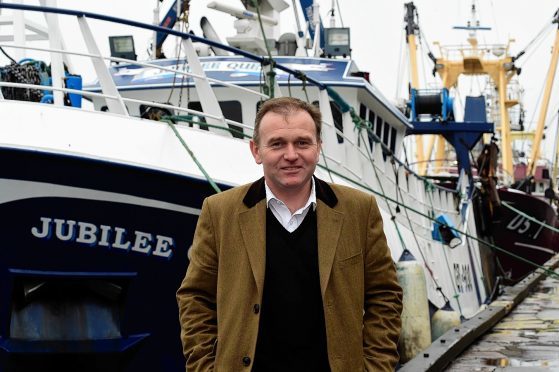UK Fishing Minister George Eustice has indicated that access rights to British waters will be a bargaining chip in the Brexit negotiations.
The Tory minister said the UK Government’s stance had not yet been settled.
But he insisted it was “unfair” the rest of the European Union currently benefits more from access to UK waters than the other way round.
And he described the fishing industry as “right to recognise the strength” of the UK’s negotiating position as a result.
Mr Eustice also made clear his government’s approach to the negotiations would be “UK-wide”.
During a parliamentary committee meeting yesterday, Labour peer Viscount Hanworth suggested the “gung-ho” attitude of the fishing industry if pursued could land the UK in “deep political trouble” with its European neighbours.
Mr Eustice accepted it would not be a good idea to go into the negotiations “like Nigel Farage and kick a table over and upset everyone”.
But he added: “The rest of the EU benefits more from access to the UK than the UK benefits from access to them.
“Is there an unfairness there? I think there is. We should look at that.
“The access other countries have to our exclusive economic zone (EEZ) and the volume of fish they catch is significant compared to the corresponding access we have in EU waters.
“I don’t think anyone would really dispute that.
“It’s recognising that. Then it’s a question of playing that hand in good faith, playing in a way that is good-natured, that’s not intended to provoke confrontation but intended to work towards a solution.”
Asked about Scotland’s role in the negotiations, he said: “It’s understood that we need to approach this UK-wide.
“The fishing industry is incredibly important in Scotland. We absolutely recognise that.”
He also said he understood why some fishermen felt they had been sold down the river when the UK joined the EU in the first place.
“I know that is still something that rankles with many in the fishing industry,” he added.
Asked whether four different policies could emerge after the negotiation, Mr Eustice said a UK-wide framework would have to be put in place before “as much control as possible” is devolved to the constituent nations in keeping with the current devolution settlement.
He said he believed the industry would be keen to maintain such a structure, adding: “They recognise the value that comes from a UK-wide negotiating position in international negotiations.”
